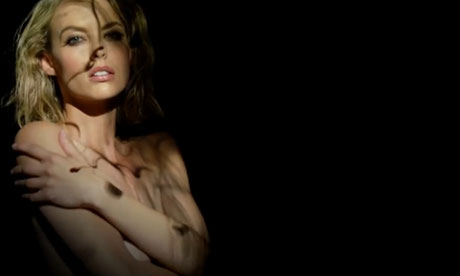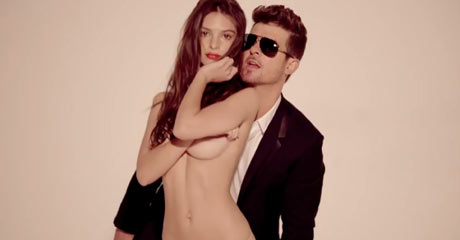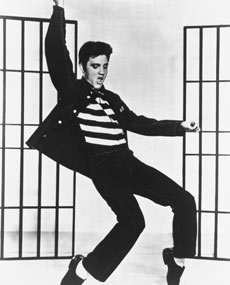
Robin Thicke, Justin Timberlake and Calvin Harris have all used topless women in their videos. But is it art or are record labels exploiting women and cashing in on YouTube revenues?
By Peter Robinson
When David Cameron announced plans for a nationwide internet porn block last [year], one question just audible above the hoots of derision from anti-censorship groups centred on whether his plans would extend to an ebook version of Fifty Shades of Grey. Would this literary triumph also be banned? Probably not, Cameron said, throwing in the fantastically I-haven't-thought-this-through clarification: "It will depend on how the filters work."
One topic he did not address, but that boasts its own shaded grey area, is the fashion for female nudity in pop videos. This debate began in March with the video to Robin Thicke's Blurred Lines, an irresistibly perky song about nightclub-based groping sessions, and one of 2013's biggest global hits. Accusations of outright misogyny in the lyrics don't stand up to close scrutiny, although declarations such as "you the hottest bitch in this place" (cheers Robin!) and "I know you want it" do appeal to the grottier end of the male pop-consuming market. But the video was more complex: a suited Thicke, styled as a park-bench-and-can-of-Tennent's version of Justin Timberlake, is joined by the song's guest performers TI and Pharrell Williams. Also present are three models who are topless and, thanks to flesh-coloured knickers, apparently bottomless as well. Cavorting ensues.
The video's experienced and well-respected director, Diane Martel, defended the promo against instant accusations of misogyny, explaining that the performance of model Emily Ratajkowski is "very funny and subtly ridiculing" – which is true – and that the models were directed to look into the camera, putting them "in the power position". Thicke later derailed Martel's argument with some panache, announcing: "People say: 'Hey, do you think this is degrading to women?' I'm like: 'Of course it is. What a pleasure it is to degrade a woman. I've never gotten to do that before. I've always respected women.'" This was news to Martel. "That's crazy," she fired back. "Maybe he wasn't thinking when he said that."
But even if you accept Martel's artistic defence of the video's supposed misogyny, her comments are less convincing in light of another major criticism: if not sexist, the video is at least eyeroll-inducingly cynical. The video, she admitted, came about as a result of "thinking about music videos, marketing, and the internet". And she wasn't the only one thinking along these lines. As Blurred Lines sat at No 1 around the world, Justin Timberlake debuted his Tunnel Vision video, for which the three male directors opted to film a fully clothed Justin intercut with topless women. More recently, Calvin Harris's elegantly filmed Thinking About You clip featured another bra-free model.

Robin Thicke's Blurred Lines video.
This rise in attention-grabbing videos might seem just the next logical step for pop, perfect complementing singles in which you will find Big Sean ruining a Jessie J single with his request for a "fish dinner", Pitbull collaborating with Flo Rida on a song about looking at arses, and charmschool firebombers the Wanted singing about a "freakiest thing" (a woman) whose general uselessness they're prepared to tolerate because: "Who cares? She walks like Rihanna." While sexist lyrics are so de rigueur that, dismayingly, they barely raise an eyebrow, chart stars wheeling in topless women for pop video is something new.
Coinciding with the rise in popular feminism – or perhaps, alarmingly, reacting against it – this new batch of videos has also pulled off the strange feat of uniting leftwing and rightwing commentators. It's true that some genres, such as hip-hop, have thrived on dementedly sexualised and unambiguously degrading imagery for decades, but this trend for explicit nudity from mainstream artists definitely represents a line being crossed. "It's fair to say the floodgates have opened," says Lee Thompson, whose career examining pop videos includes a spell as head of music at The Box. "The new Flo Rida and Pitbull effort, a sort of 2013 R&B equivalent of Stan and Jack from On the Buses, is one of the most ridiculous things I've ever seen, almost like a parody. But sadly, it's real, and no doubt a future No 1 video and single."
Most of us look back on the moral outrage that met comparatively tame groin undulations from Elvis Presley in the 50s, with some amusement. We know now that sex and sexuality is always going to be part of pop, and always should be. But if one were to show these latest videos to anyone who predicted end times for popular culture back then, they might be excused for shrugging and saying: "Well, we did warn you."
Evolving values play their part, but technology and commerce are part of the mix, too. Much of this accelerated sauciness – or straightforward exploitation – is attributable to the changing role of the music video, once an elaborate advertisement from which the viewer was encouraged to deduce that an exciting new pop release was available to purchase. In [2014], the story is slightly different. As the perceived need to own music diminishes for younger music fans, YouTube is frequently the place to hear music, replacing audio-only music libraries such as iTunes or even Spotify. Song and video are interchangeable. Significantly, it is now possible for labels to monetise YouTube views, so each view brings in revenue in a way it never did before. A high play count is useful for record labels in another way, too: it sends out the message that people are interested in a release." Promos are added to YouTube and on -demand services now more than a month ahead of iTunes single release," says Thompson, "and in many cases simply to try and drum up views and support when it comes to having 'a plot' to hit national and regional radio with. I'm told Radio 1 use this play count info as a serious guide to whether or not a career or project dies in the legendary Wednesday playlist meeting."
One marketing manager at a major UK label agrees. "Videos are about numbers now," she says. "People want to see numbers, numbers, numbers as a gauge of public interest. A YouTube view from a 50-year-old man becomes as important as from a 15-year-old boy, they all add up. And it's true that the majority of the recent videos people are talking about in these terms are by US artists."

Calvin Harris's Thinking About You.
In America, the glut of attention-seeking videos coincides with Billboard's decision in February to change the way it compiles its chart, to include YouTube views for the first time. Keith Caulfield, Billboard's associate director of charts, is not sure that this changed how labels have approached the creation of videos. Vincent Haycock, who directed the Calvin Harris video and has just finished a new Rihanna video in which she will be "pretty naked", says accusing labels of cynicism is, itself, too cynical. "You might get labels saying they want something 'viral', which is an annoying trend, and what they mean is that they want something provocative and attention-grabbing that's not necessarily expensive," he says. "But that's the closest I've seen to a label specifically wanting a ruckus. There might be a label out there going: 'Ooh, if we do something really provocative for this young artist we might get some attention', but, usually, labels will freak out about nudity, because it just won't get as much play on TV."
The implication, then, is that the ideas are more likely to come from the artist or director, but our major label marketing contact is not so sure. "There are more women, and more women in senior positions, in record labels than ever, and in my experience there are also fewer sexist men," she says. "Viewing these videos as they arrive, at people's desks, in label meetings, can be rather cringe-inducing. Eyes do roll, both men's and women's. But if some of the more extreme examples of controversial pop videos didn't inspire vast outrage and threats of censorship, everyone involved in making them would be very disappointed."
Haycock, however, adds that the brief nudity in the Calvin Harris video was not in his original treatment (so presumably wasn't encouraged or green-lighted by the label) and the suggestion came on set from the model herself, who reasoned it would make more sense in the context of the story the video was trying to tell. "It's just context," he says. "You watch Nicole Kidman get naked in Eyes Wide Shut and nobody goes around saying it's misogynistic, because it's Kubrick."
On this point, it is worth noting that while YouTube banned the explicit version of Thicke's video, Timberlake's Tunnel Vision clip was initially banned then reinstated by the service because it was, apparently, art. "While our guidelines generally prohibit nudity, we make exceptions when it is presented in an educational, documentary or artistic context," Google explained, "and take care to add appropriate warnings and age-restrictions."
"The fact that they allowed Timberlake's video to be housed on YouTube is very interesting, considering they generally have a no-nudity policy," says Caulfield. YouTube's power in this field, and the way it can step in to make value judgments in a way traditional censors generally won't, is incredibly significant.

Groin undulations: Elvis Presley in the 1957 film Jailhouse Rock. Photograph: AP
The last time over-sexualised pop imagery hit the headlines was in 2011, when Mike "Aitken & Waterman" Stock hit out at "sluttish" female popstars such as Lady Gaga. His targets back then were slightly off the mark – Gaga, for instance, often appears in states of undress that make you wonder whether she shouldn't sling on a couple of gammon steaks to keep warm, but she clearly intends to use her body to provoke, or make an artistic statement, rather than to titillate. Nonetheless, Stock's observations of the latest trend in videos are more well-judged. "It represents the cycle we're all trapped in," he says of Blurred Lines. "Do boys expect girls to behave and dress that way? Do girls feel that to be liked by boys, they have to act this way? If girls dress that way do boys have to respond favourably? And if boys respond favourably do girls feel the need to carry on in the same way? And so it goes round."
From a songwriter's perspective, he says, this is creatively dangerous. "Trying to outdo your competition with a better tune was once the ambition of the creative forces working in the music business. Nowadays it is a competition to see who can sink the lowest, which has the effect of driving pop into pornography. A real fight to the bottom."
It is true that the subtlety of Martel's message behind the Blurred Lines video (women making strong eye contact with the camera and therefore being powerful), or Haycock's defence of context and narrative, might well be lost on the average teenage boy. And while the counter argument is that in 2013 he is three clicks away from actual pornography, the fact remains that pop videos are in the peripheral vision of anyone on social media, in a way pornography still isn't. People tend not to tweet links to porn, or like them on Facebook. But maybe in a decade they will, and maybe the mainstream deployment of nudity in music videos will accelerate that shift in values.
Whether it is cynical, misogynistic, artistic, all three or none, perhaps this trend will prove a popcultural blip, a peculiar aberration like #hashtaggedalbumtitles and the enduring success of the Script that music fans in the future will look back on as nothing more than a snapshot of pop culture in [2014]. But it is hard not to feel that in [2074], people are more likely to look back on the fuss around Blurred Lines in the way we now regard the reaction, 60 years ago, to Elvis: as rather quaint and silly.
http://www.theguardian.com/music/2013/aug/08/naked-women-pop-videos-justin-timberlake
No comments:
Post a Comment